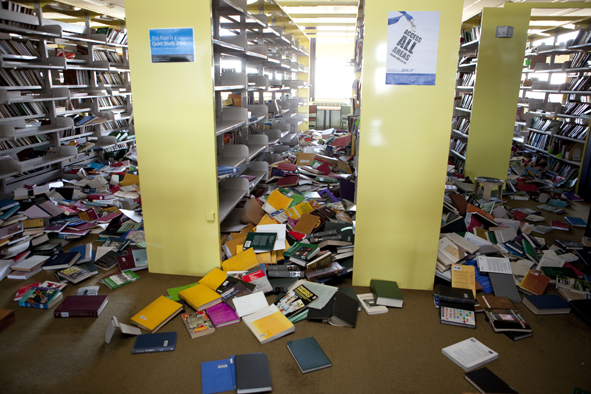Christchurch, New Zealand, recently experienced a 7+ earthquake. A friend who works in the University of Canterbury library sent me this link to show what half a million books look like when thrown on the floor – – – http://www.canterbury.ac.nz/photos.shtml
One illustration of many in the above link:
The problem was that the building was deliberately designed to sway in an earthquake. Now whoever thought of that idea obviously hated librarians and/or libraries.
(I’ve never been able to understand why anyone opts to live and work in an earthquake zone!)
I’m a librarian, but I never see or touch a book. I work in a field that seeks to deliver electronic or digital resources to users online. Is it too idealistic to suggest that it might be more economical in the long term that all those scattered books should simply be picked up and scanned to be available electronically now? Stuff the reshelving by going crosseyed trying to put them all back until the next quake.
<
h4>Related articles
- Christchurch Earthquake Visualizations (gearthblog.com)
- “New Zealand earthquake rips a new fault line across the world… moving one side of the earth 11ft to the right” and related posts (asianenergy.blogspot.com)
- The Canterbury earthquake (marginalrevolution.com)
If you enjoyed this post, please consider donating to Vridar. Thanks!


We all live on a fault line in new zealand. However the benefits generally outweigh the risks. 🙂
I have 500+ physical books but I agree that the future of libraries is digital. As long as it isn’t encumbered with some form of DRM. Ugh.
Oh, and we can’t help living in an earthquake zone, the entire Eastern part of Asia is part of the Ring of Fire.
Yeh, digital rights management issues are the big brake on going digital for now.
It’s easy to be both pessimistic and polyannish about the future. There needs to be a new model for rights management. But I wonder if the unpredictability of the global economy will throw up some decisive factor we are not yet expecting.
“(I’ve never been able to understand why anyone opts to live and work in an earthquake zone!)”
Well I can’t understand why anyone would opt to live in a country that makes the sale and consumption of chewing gum illegal and equivalent to hard drugs.
“Is it too idealistic to suggest that it might be more economical in the long term that all those scattered books should simply be picked up and scanned to be available electronically now?”
Since the mid 1990s the policy of the National Archives of Singapore is to microfilm paper records and to then destroy the originals. I see this curious Singapore predilection for destroying original written records and original published books continues.
Singapore is an OK place, it just has a couple of strange policies.
I know of very very few countries with government policies that I can feel comfortable with. I find it more embarrassing and shameful to live under governments that kill people (whether their own and/or foreigners) and scapegoat and treat certain minorities as scum. We can be inspired by the Sophie Scholls to do what we can to resist or work towards more humane societies. This planet is not really the optimum for sentient species, but if given a choice I think I’d always opt to stay where I am less likely to face the uncaring forces of nature. But now I think of it, my house in Australia is sitting in an “extinct” volcanic crater, and a geologist has since said there is no such thing as an “extinct” volcano 🙁
C’est la vie. That’s planet Earth for ya.
Gum chewing in Singapore is by no means equivalent to hard drugs. One incurs a monetary fine, the other death. The background and reasons for the chewing gum ban can be read here: http://en.wikipedia.org/wiki/Chewing_gum_ban_in_Singapore
I work in areas involving digital preservation systems and know the move to digitization within contexts of authentication assurance standards and systems is inevitable now for many countries. There’s simply too much paper to keep at the current rates of accumulation. Certain historic records are a different story, though.
Evie!!!!
Sorry, make that “Evy!!!!!!”